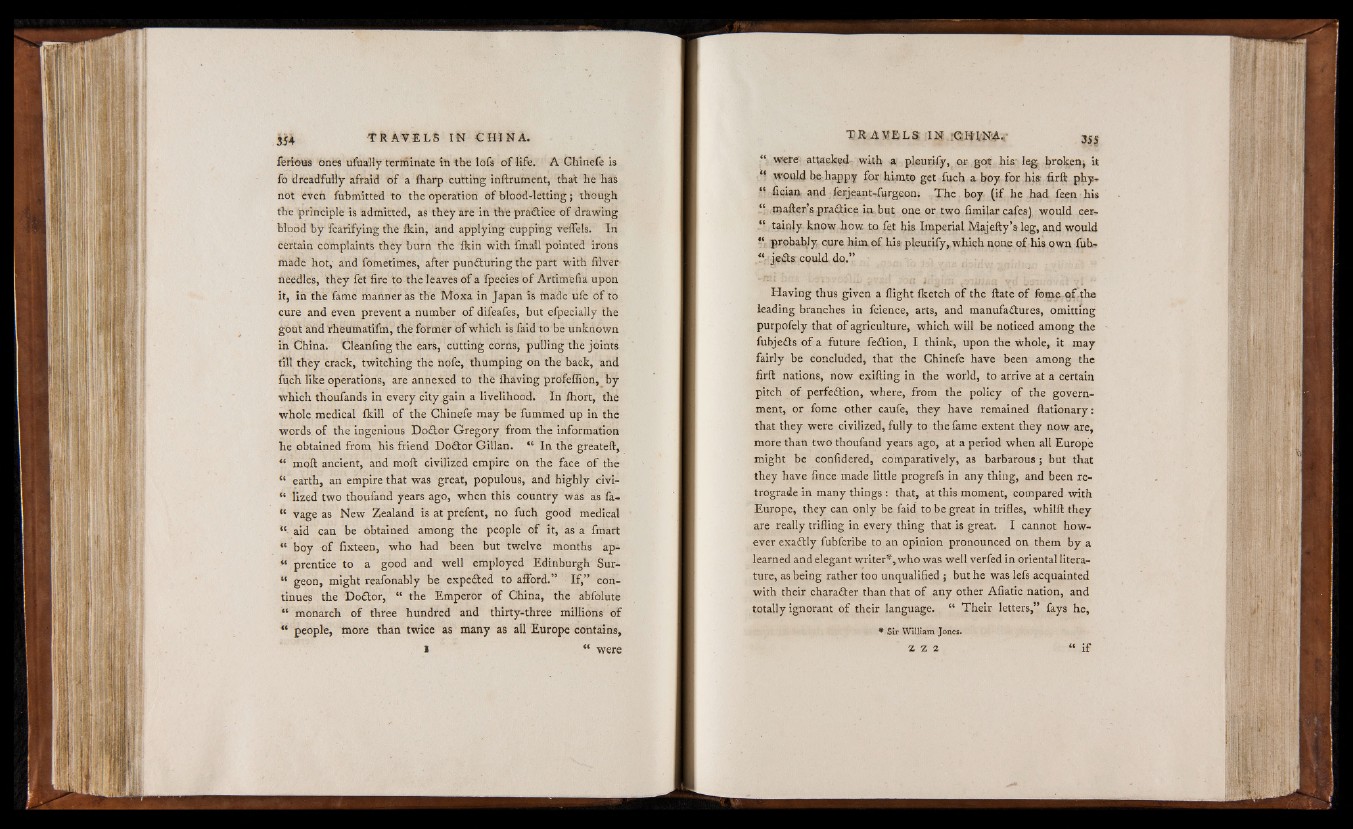
ferious ones ufually terminate in -the iofs o f life. A Ghinefe is
fo dreadfully afraid o f a {harp cutting inftrutnent, that he has
not even fubmitted to the operation o f blood-letting; though
the principle Is admitted, as they are in the practice o f drawing
blood by fcarifying the flcin, and applying cupping veffels. In
certain complaints they burn the {kin with fmall pointed irons
made hot, and fometimes, after puncturing the part with frlver
needles, they fet fire to the leaves o f a fpeeies o f Artimefia upon
it, in the fame manner as the Moxa in Japan Is made ufe o f to
cure and even prevent a number o f difeafes, but efpecially the
gout and rheumatifm, the former o f which is/aid to be unknown
in China. Cieanfing the ears, cutting corns, pulling the joints
till they crack, twitching the nofe, thumping on the back, and
fuch like operations, are annexed to the {having profeffion, by
which thoufands in every city gain a livelihood. In ihort, the
whole medical {kill o f the Chinefe may be fummed up in the
words o f the ingenious DoCtor Gregory from the information
he obtained from his friend DoCtor Gillan. “ In the greateft,
“ moft ancient, and moil civilized empire on the face o f the
“ earth, an empire that was great, populous, and highly civi-
“ lized two thoufand years ago, when this country was as fa-
“ vage as New Zealand is at prefent, no fuch good medical
“ aid can be obtained among the people o f it, as a fmart
“ boy o f fixteen, who had been but twelve months ap-
r prentice to a good and well employed Edinburgh Sur-
“ geon, might reafonably be expeCted to aiford.” If,” continues
the DoCtor, “ the Emperor o f China, the abfolute
“ monarch o f three hundred and thirty-three millions o f
“ people, more than twice as many as all Europe contains,
1 * were
“ were attacked with a pleurify, pr got hi&- leg broken, it
" would be happy for himto get fuch a boy for his- firft phy-
“ fician and ierjcaut-furgeon. The boy ( if he had feen his
-i meter’spra£tice in but orte or two fimilarcafes) would cer-
“ tainjy know how. to fet his Imperial Majefty’a leg, and would
“ probably, cure him o f his pleurify, which none o f his own fub-
i‘ je&s could, do.”
Having thus given a flight iketch o f the ftate o f feme, o f the
leading branches in fcience, arts, and manufactures, omitting
purpofely that o f agriculture, which will be noticed among the
fubjeCts o f a future feCtion, I think, upon the whole, it may
fairly be concluded, that the Chinefe have been among the
firft nations, now exifting in the world, to arrive at a certain
pitch o f perfection, where, from the policy o f the government,
or fome other caufe, they have remained ftationary:
that they were civilized, fully to the fame extent they now are,
more than two thoufand years ago, at a period when all Europe
might be confidered, comparatively, as barbarous ; but that
they have fince made little progrefs in any thing, and been retrograde
in many things : that, at this moment, compared with
Europe, they can only be faid to be great in trifles, whilft they
are really trifling in every thing that is great. I cannot however
exaCtly fubfcribe to an opinion pronounced on them by a
learned and elegant writer*, who was well verfed in oriental literature,
as being rather too unqualified ; but he was lefs acquainted
with their character than that o f any other Afiatic nation, and
totally ignorant o f their language. “ Their letters,” fays he,
* Sir William Jones.
Z Z 2